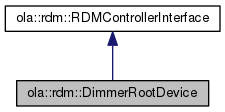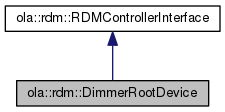 |
Open Lighting Architecture
Latest Git
|
 |
Open Lighting Architecture
Latest Git
|
The root device in the simulated dimmer.


Public Types | |
| typedef const std::map< uint16_t, class DimmerSubDevice * > | SubDeviceMap |
Public Member Functions | |
| DimmerRootDevice (const UID &uid, SubDeviceMap sub_devices) | |
| void | SendRDMRequest (RDMRequest *request, RDMCallback *callback) |
| Send a RDM command. More... | |
| ola::rdm::DimmerRootDevice::DimmerRootDevice | ( | const UID & | uid, |
| SubDeviceMap | sub_devices | ||
| ) |
Create a new dimmer root device. Ownership of the DimmerSubDevices is not transferred.
|
virtual |
Send a RDM command.
| request | the RDMRequest, ownership is transferred. |
| on_complete | The callback to run when the request completes. |
Implementors much ensure that the callback is always run at some point. In other words, there must be no way that a request can be dropped in such a way that the callback is never run. Doing so will either block all subsequent requests, or leak memory depending on the implementation.
Also the implementor of this class may want to re-write the transaction #, and possibly the UID (changing src UIDs isn't addressed by the RDM spec).
The RDMRequest may be a DISCOVERY_COMMAND, if the implementation does not support DISCOVERY_COMMANDs then the callback should be run with ola::rdm::RDM_PLUGIN_DISCOVERY_NOT_SUPPORTED.
Implements ola::rdm::RDMControllerInterface.
 1.8.13
1.8.13